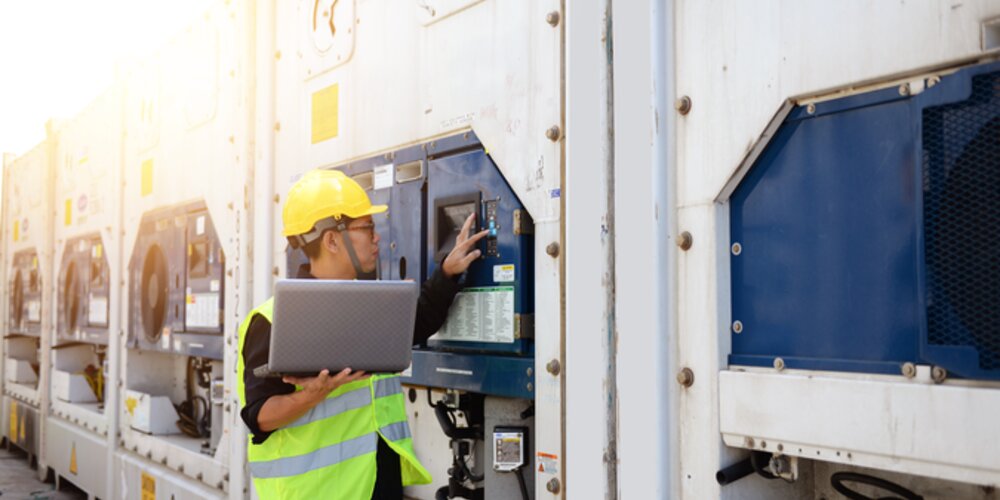TT Talk - Keep it cool

Technological advances in digitalisation of process, telematics and smart containers provide opportunities to mitigate risk for the temperature controlled supply chain. However, much still relies on human intervention – and that is the aspect that TT’s claims experience suggests continues to produce losses.
There are a large range of temperature sensitive commodities that transverse the globe every day, transported in an array of cargo transport units (CTU’s), such as trailers and reefer containers. While many perceive that sensitive or perishable goods are predominantly foodstuffs, in fact there are many different commodities that must carried in a controlled environment, such as flowers and live plants, pharmaceuticals and dangerous goods to name a few. Indeed, a number of commodities require even greater sophistication relating to venting or controlled atmospheres.
However, where there are deviations in the cool chain, whether during a breakdown in the equipment or an error in communication, the result is typically catastrophic for the cargo. A frozen shipment of high value seafood, for example, will be irrecoverably damaged in the event that the temperature control is erroneously set at +25Deg Celsius instead of -25Deg Celsius.
Ensuring complete integrity through the entire supply chain can be critical not only to protect the cargo, but also maintain safety
Where dangerous goods and chemicals are concerned the resulting damage can have wider reaching consequences. More sensitive cargoes such as fertilisers or those that polymerise have the propensity to ignite or explode if not kept within required temperature parameters. Ensuring complete integrity through the entire supply chain can be critical not only to protect the cargo, but also maintain safety.
Innovation
Inevitably, there are a number of entities seeking to bring greater certainty and control into the cool chain processes. For example, one of the TT Club innovation in safety award finalists in 2022, Intermodal Telematics, has developed a multiple temperature alert system that serves to monitor the temperature of the cargo during transit within tank containers and rail tank cars. This digital solution provides early warnings of any temperature irregularity during transit, affording opportunity for experts to intervene, if required; more detail can be found in the awards digest.
Shippers and logisticians already should be aware of seasonal climate around the globe, where the ambient temperature must be taken into account when consigning temperature sensitive goods into the supply chain. This includes packing, storage and transit, recognising that delays through the supply chain might lead to prolonged periods exposed to higher temperatures or direct sunlight. While reefer trailers and containers will in any event provide a degree of protection, ensuring that they are set correctly and remain in good working order remains of great importance.
While reefers… provide a degree of protection, ensuring that they are set correctly and remain in good working order remains of great importance
LogChain is a further example, in the chemical supply chain, of an organisation seeking to improve process through digitisation. A logistics platform for the chemical industry, LogChain provides manufacturers and operators full visibility and transparency of their trade lanes in real time. A single source of truth regarding the product, in particular any requirements around temperature control greatly diminishes the chances of a mistake or mis-communication manifesting in a safety incident.
Risk considerations
There are inevitably circumstances, due to the typical nature of trade, where reefer units will need to be repositioned. Transporting empty equipment is a costly endeavour, so reefers are not infrequently used to transport goods in non-operating mode as if they were a standard dry van. This too has the potential to generate interesting claims. Not just where perhaps an incompatible cargo has been packed, leading to damage to the unit, but what happens when a cargo of electronic equipment has been packed and mid-journey a well-meaning reefer engineer plugs the reefer in, not realising that it was intentionally unplugged.
It is estimated that around one third of all food produced for human consumption is lost or wasted each year. Foodstuff cargoes are transported in ever increasing volumes in reefer units, often globally, introducing multiple touch points and nodes in the supply chain where the exchange of accurate information is critical. Many of the claims received by TT relate to inaccurate, ambiguous or poor communications and understanding; what are perhaps with hindsight very obvious and simple errors, a plus instead of a minus, or setting in DegF rather than DegC can be extremely harmful to the cargo.
Due diligence and knowing your customer coupled with a sound understanding of the cool supply chain will assist those packing, handling and transporting temperature controlled cargoes to manage the associated risks. TT recently published a revised edition of the temperature controlled cargo StopLoss guidance document that provides detailed insight into the primary areas of risk, offering guidance to mitigate losses and outlining good practice.
In conjunction with this edition of TT Talk, the Club is publishing a new edition of the TT Brief suite of guidance documents, aimed at operational personnel, those who are actually packing the goods, inspecting the equipment and setting the temperature. The TT Brief raises awareness of the main issues that result in damage to cargo through the temperature controlled supply chain in an accessible format. The TT Brief highlights risk mitigation strategies that can be adopted in connection with communication, packing and pre-trip inspection as well as drawing attention to a series of red flags.
Summary
Technology and attention to process optimisation will undoubtedly continue to improve risk and the degree of control in transit where temperature controlled cargoes are concerned. Nevertheless, much today still relies on human interventions – whether that be interpreting instructions, ensuring that T-bars are free of debris, effective packing of cargo to facilitate air flow, setting the temperature of the equipment, monitoring performance or educating digital systems in the first instance. The current loss profile could be significantly improved through deeper understanding of the common risks, improved communications and implementing robust checking processes throughout.
-
If you would like further information, or have any comments, please email us, or take this opportunity to forward to any others who you may feel would be interested.
Documents
TT Talk Edition 299 (Chinese) (599 kB) 19/06/2023
- Author
- Mike Yarwood
- Date
- 06/06/2023





